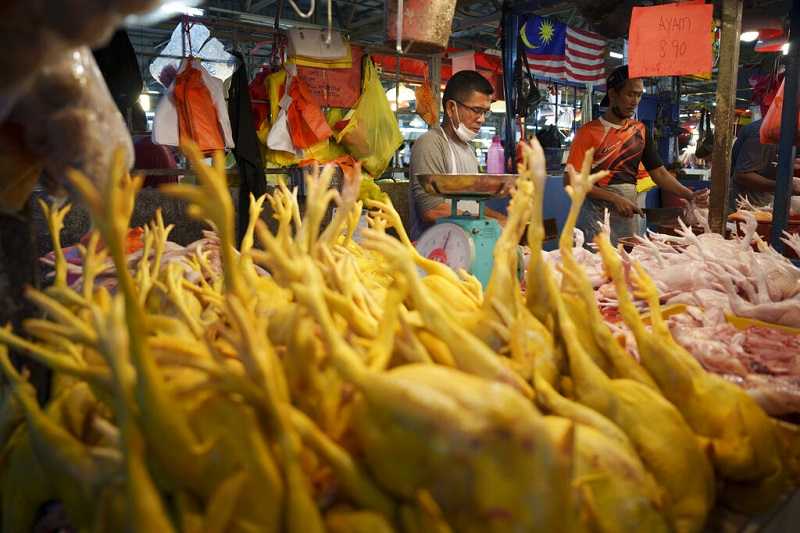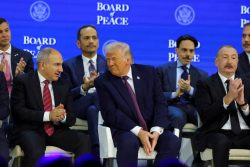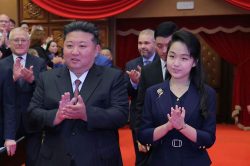
A seller prepares freshly butchered chickens at the Kampung Baru wet market in Kuala Lumpur, Malaysia, Tuesday, May 31, 2022.
16:39 JST, May 31, 2022
KUALA LUMPUR, Malaysia (AP) — Malaysia will stop exporting chickens from Wednesday in a protectionist move to bolster domestic food supply, sparking distress in neighboring Singapore where chicken rice is a national dish.
Prime Minister Ismail Sabri Yaakob announced last week that, beginning June 1, Malaysia will ban exports of 3.6 million chickens a month until domestic prices and production stabilize. The move is felt most in Singapore, which sources a third of its poultry from Malaysia.
Almost all the chickens are imported live to Singapore, where they are slaughtered and chilled. Singapore consumers have been rushing to stock up on fresh chicken ahead of the ban, with local media reporting that shelves in some wet markets and supermarkets have been cleared of poultry.
The Singapore Straits Times said chicken sellers predicted the cost of chilled chicken could rise by up to 30%, sending chicken dish prices soaring. The Singapore government has urged consumers to switch to frozen chicken and other alternative meats, and is exploring new markets for fresh chicken.
But there is concern over the fate of the ubiquitous chicken rice that is sold everywhere from hawker stalls to top hotels. Popular eatery Tian Tian Hainanese Chicken Rice, which gets its poultry entirely from Malaysia, reportedly said it will introduce pork and seafood dishes instead of using frozen chicken if it fails to find new suppliers.
Malaysia’s protectionist move comes as countries worldwide grapple with soaring food prices, fueled partly by the Ukraine war. Ukraine is a major exporter of corn and grains that are key components of chicken feed. India has restricted sugar and wheat exports, while Indonesia temporarily halted — and then lifted — palm oil sales abroad.
Apart from the export ban, Malaysia also abolished import permits for chicken and other foods to boost food supply and curb prices amid public anger. It has earlier capped chicken prices and allocated subsidies for farmers squeezed by rising cost of chicken feed, partly caused by a weakening Malaysian currency.
The export ban came as a surprise by Ismail’s government, which took power in August and faces a general election next year. The government is also investigating claims that cartels are controlling the price and supply of chicken.
The ban not only caused alarm in Singapore but also troubled smaller Malaysian poultry farmers who supply to Singapore to help keep their operations afloat. The government didn’t say how long the export ban will last, but officials expect supply and prices to normalize within a month.
Top Articles in News Services
-

Prudential Life Expected to Face Inspection over Fraud
-

Hong Kong Ex-Publisher Jimmy Lai’s Sentence Raises International Outcry as China Defends It
-

Japan’s Nikkei Stock Average Touches 58,000 as Yen, Jgbs Rally on Election Fallout (UPDATE 1)
-

Trump Names Former Federal Reserve Governor Warsh as the Next Fed Chair, Replacing Powell
-

Suzuki Overtakes Nissan as Japan’s Third‑Largest Automaker in 2025
JN ACCESS RANKING
-

Japan Institute to Use Domestic Commercial Optical Lattice Clock to Set Japan Standard Time
-

Israeli Ambassador to Japan Speaks about Japan’s Role in the Reconstruction of Gaza
-

Man Infected with Measles May Have Come in Contact with Many People in Tokyo, Went to Store, Restaurant Around When Symptoms Emerged
-

Prudential Life Insurance Plans to Fully Compensate for Damages Caused by Fraudulent Actions Without Waiting for Third-Party Committee Review
-

Woman with Measles Visited Hospital in Tokyo Multiple Times Before Being Diagnosed with Disease



























